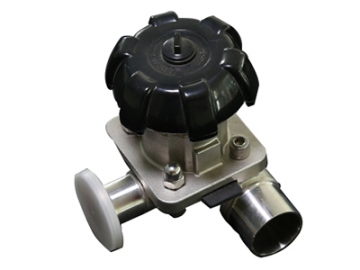Sanitary Diaphragm Valves
Request a Quote
Sanitary diaphragm valves are used for fluid control and switch and also widely used in the sanitary and sterile processing in pharmaceutical industry. Compared with other valves, it’s easier to clean and can treat material with particles better. When it comes to the control of flow rate, the cavitation is less.
Structures- Catalog: straight through valves, L-valves, T-valves, four ways diaphragm valves and multiway valves stank bottom valves
- Actuators: manual or pneumatic
- Equip with multifunctional actuators (valve positioner) on the liquid control system to control the valve’s flow rate and give feedback of the location of valves.
- Size: DN20-DN80
- Maximum temperature: -30℃ to 150℃ (depending on seals, stainless steel actuators)
- Maximum temperature: -30℃ to 130℃ (depending on seals, plastic actuators)
- Maximum pressure: 0.6MPa
- Connection: weld, compression fitting, flange, clamp flange
- Membrane material: PTFE/EPDM
- Body material: 316L
- All surfaces of valves are mechanical polishing finish to make the Ra≤0.2μm.
- Seals materials can choose from food grade silica gel, PTFE, EPDE.
- The joint is fast-operating spin collar to make the pipes and valves easier to clean. Also, it can treat materials with particles.
- Both the manual and pneumatic are available.
- PTFE membrane can choose from open or closed type with FDA certifications.
- EPDM membrane can be used to support between two PTFE membranes to realize zero dead space and prevent medium detention and cross contamination.
- The actuators and connection mode are chosen based on client's need.
- Manual T-shaped diaphragm valves
- Pneumatic straight through diaphragm valves
- Manual sampling diaphragm valve
- Manual multiway valves tank bottom valve
- Manual sterile tank bottom valve
- Pneumatic sterile tank bottom valve
